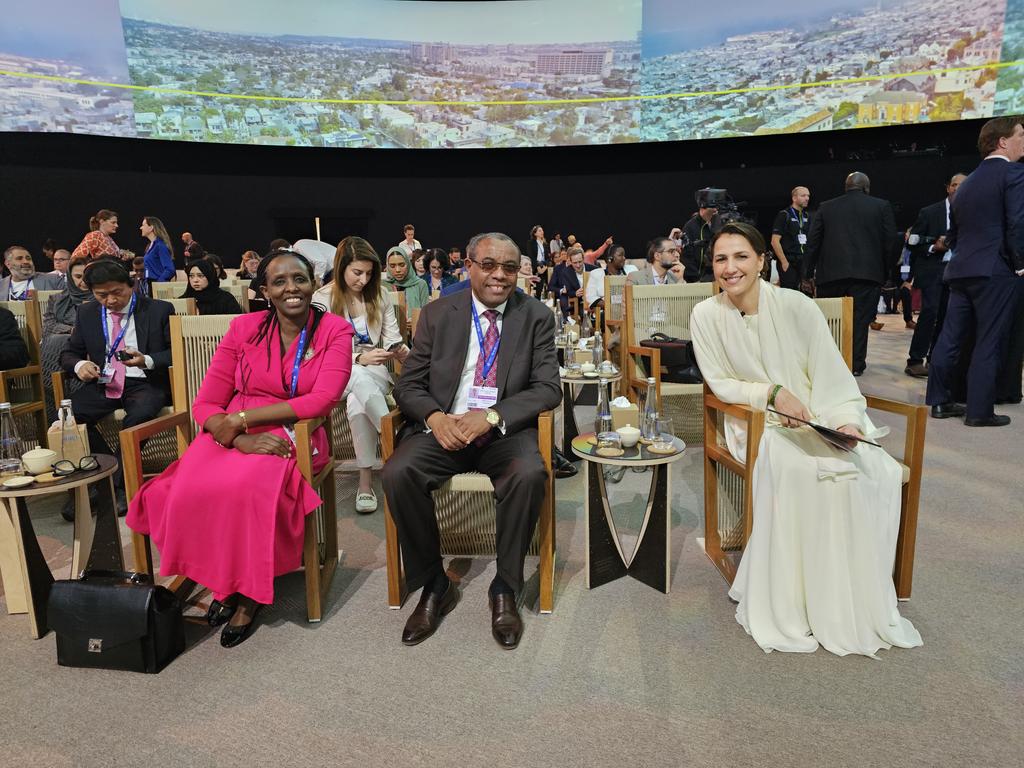By Anthony Muchoki
AGRA President, Dr. Agnes Kalibata, has characterized COP28 as a turning point in the dialogue surrounding food systems, bringing #FoodSystems into the heart of mainstream discussions at the 28th Conference of the Parties to the United Nations Framework Convention on Climate Change. She emphasized that this landmark decision represents a watershed moment in the young history of food systems.
Dr. Kalibata noted, “A very significant moment in the young history of #FoodSystems when COP28 Presidency, Mariam Almheiri, UAE Minister of Climate Change & Environment, took up the challenge of moving the UN Food Systems Coordination Hub into mainstream COP discussions. We are very proud of this moment.”
Dr. Kalibata served as the UN Secretary-General’s 2021 Food Systems Summit Special Envoy and is an unwavering champion for sustainable food systems. She commended the unwavering commitment of the COP28 Presidency, particularly Ms. Mariam Almheiri, UAE Minister of Climate Change & Environment, for assuming the responsibility of advancing food systems to the forefront of climate discussions. This bold and visionary step signifies the growing recognition of the paramount importance of food systems in addressing the intertwined challenges of climate change, food security, and sustainable development.
“I promised the world that we would move #foodsystems into mainstream @COP28_UAE. Today, we have 134 countries, home to 5.7 billion people and 500 million farmers, signing the #UAEdeclaration on #FoodSystems, which signifies their inclusion in mainstream COP discussions,” Minister Mariam said.
Here’s an overview of how COP28 is elevating the food systems discussion:
COP28 is making history by prioritizing food systems transformation in its agenda, marking the first time a COP has placed such a strong emphasis on this critical topic.
Focus on Food Systems Transformation: COP28 has established a dedicated thematic area focusing on food systems. This recognition highlights the pivotal role that food systems play in both mitigating and adapting to climate change.
High-Level Dialogues: Several high-level dialogues within COP28 are specifically centered on food systems. Notably, the UAE Ministry of Climate Change and Environment, in collaboration with the Gates Foundation, and the African Union are convening dialogues that delve into the intricacies of food systems.
Launch of Key Initiatives: COP28 has witnessed the launch of crucial initiatives related to food systems. Among them is the Re-GAIN initiative, a partnership between the Green Climate Fund and AGRA. Re-GAIN aims to mobilize a substantial $50 billion to assist African farmers in adapting to climate change and bolstering their resilience.
Stakeholder Engagement: A diverse range of stakeholders, including governments, non-governmental organizations, private sector entities, and farmers’ organizations, are actively participating in the food systems discussions at COP28. This inclusive approach fosters a vibrant exchange of ideas and perspectives.
African Focus: COP28 recognizes Africa’s heightened vulnerability to climate change impacts on food systems. Consequently, the conference places special emphasis on addressing the continent’s unique needs. This includes the introduction of a dedicated Africa Food Systems Day and the launch of the Africa Food Future initiative, aimed at mobilizing $1 billion to support African food systems over the next five years.
COP28 is conveying a resounding message: food systems transformation is indispensable for combating climate change. The ongoing discussions and initiatives at the conference are laying the groundwork for a more sustainable and resilient future for food systems globally.
COP28 has established specific goals related to food systems
Increased Investment in Sustainable Agriculture: COP28 seeks to mobilize substantial financial resources to assist developing countries in transitioning to more sustainable agricultural practices.
Food Loss and Waste Reduction: Reducing food losses and waste is pivotal for enhancing food security and curbing greenhouse gas emissions. Initiatives like Re-GAIN are at the forefront of advancing this agenda.
Climate Resilience of Food Systems: COP28 promotes the development of climate-smart agricultural practices to help farmers withstand climate change impacts like droughts and floods.
Inclusivity and Equity: COP28 recognizes the importance of inclusive and equitable food systems transformation, ensuring that all stakeholders, particularly smallholder farmers and marginalized groups, have a voice and reap the benefits of these changes.
If the goals are met, COP28 will be fast-tracking food systems transformation, making a substantial contribution to building a more sustainable and climate-resilient future for mother earth.
